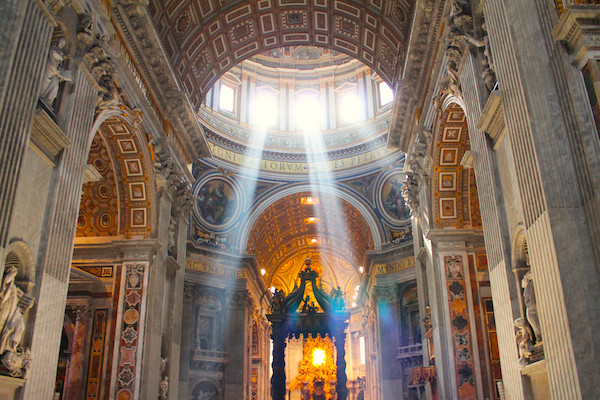The Glory of Being Shut Up
by Marc Barnes
Filed under Architecture, The Church
“Christ prophesied the whole of Gothic architecture in that hour when nervous and respectable people (such people as now object to barrel organs) objected to the shouting of the gutter-snipes of Jerusalem. He said, 'If these were silent, the very stones would cry out.' Under the impulse of His spirit arose like a clamorous chorus the facades of the mediaeval cathedrals, thronged with shouting faces and open mouths. The prophecy has fulfilled itself: the very stones cry out.” - G.K. Chesterton
We lost something important when our Western culture ‘outgrew’ its infatuation with obscenely large cathedrals, ornate basilicas, dark stone chapels, stretching towers, and lonely crypts. We lost something important – a unique human experience – when religious people began their relationship with the plaster-church over the ‘old-school’ church.
We lost our awareness of the power of Place, specifically, its power to shut us up. Have you ever seen a group of tourists walk into a basilica? They respect the great artistic achievements of the Old Church without respect for the Old Church. They walk in through the creaking, wooden side-door; they are talking about their diet plans, and the relative evils of cholesterol. Through the door now, (they smell the incense), into the foyer, (they feel the cool of the stone ease away the heat of the day from their skin), and past the first arch. Wait for it, wait for it…now.
Their words die on their lips. Mouths open loosely, and necks crane instinctively upwards. Their group loosens, they begin to wander away from each other, one towards the candles, another towards Our Lady of Sorrows, and another towards the altar, each waltzing in small circles as they try to take everything in. How many times I’ve seen this, and how many more times I’ve performed this little unconscious ritual; this silent transformation; this unrequested dance.
The beauty of a basilica is that men do not visit it, it visits men. The beauty of it, yes, but also the rudeness of that dark, stone temple, for it is a hand clamped over the modern mouth, a sturdy grasp guiding one through side-chapels.
It demands that you center yourself. Here are the pews on either side, the symmetrical side-chapels, everything mirrored and proportional, even the interlacing tessellations of granite that spread out from a single star on the floor. Stand on the star. Then look straight ahead. There are two things that everything else seems to reflect from. Two things in this building that form and beauty and structure emanate from. One is you, in the center of the church, having wandered there almost by by necessity, by the strange force of the symmetry all around you. The other is the tabernacle. Of the two, choose now whom you will serve.
Every cathedral makes this bold, arrogant challenge to the visiting man. The sheer size, scope, and intricacy of these temples speaks of the total, radical commitment men gave to God; to build him a dwelling place, even if they were not to see it complete; to serve him. These living stones are their pronounced fiat; their yes; their choice. What is yours? For when Catholic or atheist leaves, the tabernacle remains. The Body of Christ will stay – the red candle still burn – and the basilica will circle and reflect around it, like ripples in a pool, emanating from the drop of some inexplicable and sublime stone.
What does a plaster-church say? “I will not be here long.”
What does a cathedral say? “You cannot deny me. For I’ve outlasted your forefathers, and I’ll outlast you.”
The cathedral speaks of the endurance of Catholicism. This is not to deny the beauty of a simple church, of the awesome fact that the universal quality of Catholicism means that Catholics can celebrate mass in their living rooms, shelters, canoes, and battle-fields. This is simply to lament that the age of the Cathedral is done, the age where one was silenced, for perhaps the briefest of moments in a life filled with noise, and brought to worship.
Perhaps the tourists would never acknowledge that they perform an act of worship, walking into a basilica. But what else are we to call it, when we all shut up, slow ourselves and walk small-stepped in awe, reduced to whispers and peace?
The Catholic Church holds that worship is not something we do. No, worship is a gift we receive. I hold that the cathedrals, basilicas, and lasting chapels of the Church are awesome conveyors of that gift, rudely thrusting worship into the hearts of all who enter them.
But perhaps there is one place left where one can experience this bit of humanity. I speak, of course, of the library, where my writings are written. It would not be unwise for the seeking, modern man, to stand in some old, dusky library, close his eyes amidst the books that surround him, and think of how such a little peace would be magnified, if he were surrounded by saints, angels, pilgrims, prayers, cool stone, and holy incense.
A man in a library - if he is a man at all – is humbled by the mass of human knowledge, wisdom, and understanding that surrounds him.
A man in a cathedral is humbled because he, as a member of the human race, has performed the incredible and audacious act of surrounding the unsurroundable God with stone.
Related Posts
Note: Our goal is to cultivate serious and respectful dialogue. While it's OK to disagree—even encouraged!—any snarky, offensive, or off-topic comments will be deleted. Before commenting please read the Commenting Rules and Tips. If you're having trouble commenting, read the Commenting Instructions.













